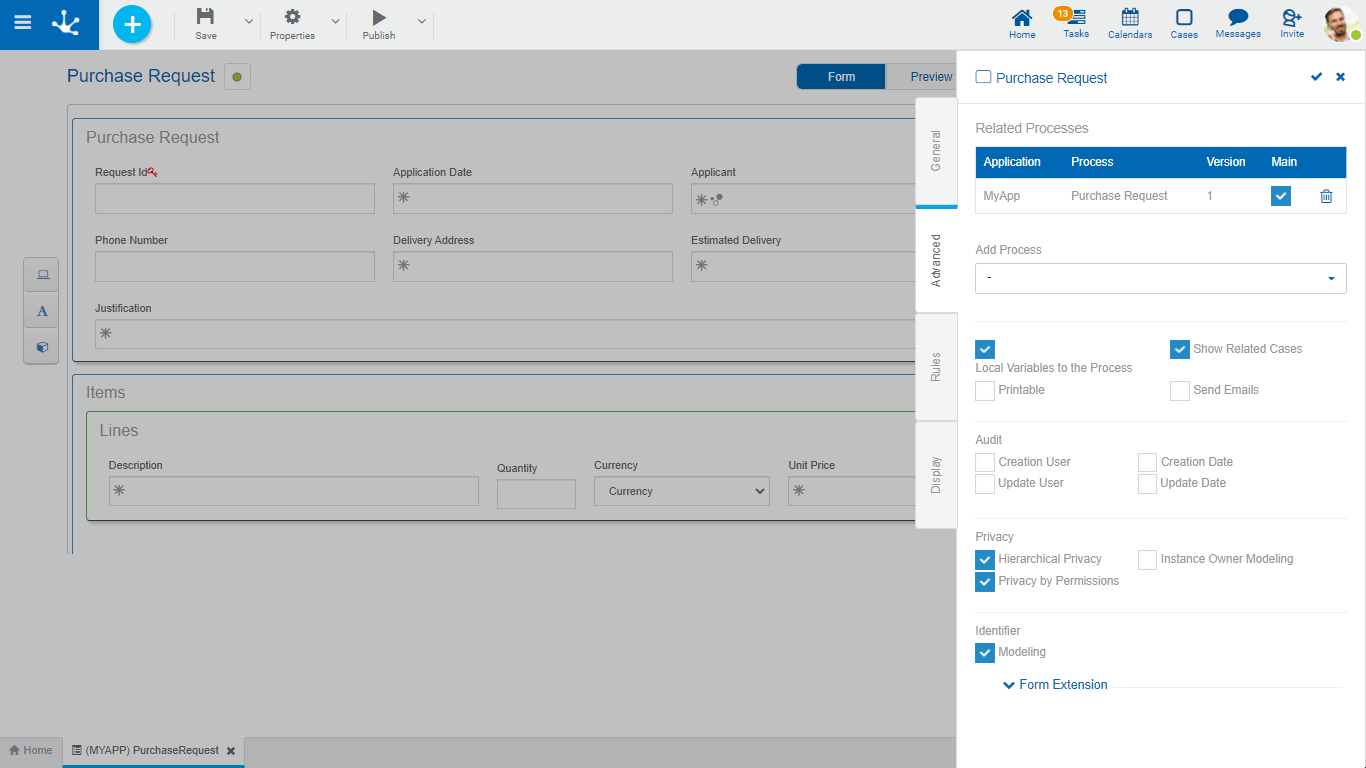Advanced
The second tab of the side panel corresponds to advanced information of the form.

Properties
Every form can be associated with one or more processes. The user can select them from the set of available processes and define form relation properties. Once selected, the processes are displayed in a grid with their corresponding properties.
•Application
•Process
•Version
In complex processes with a large number of variables, these variables can be defined in different entities, all related to the process. If this property is checked, it means that the modeled form is the most representative for the related process. This means that in the gallery of forms and tasks, the main form is the one where the tasks are displayed, even if other forms are used in the different activities.
A process can be related to several forms, of which only one can be indicated as the main entity. If in the Related Processes grid, the process with this property selected is already defined as main in another form, then the user receives an error message when the form is published.
Add Process
Allows to select a process from the drop-down list of available processes, each of the chosen processes is added to the grid of Related Processes.
Local Variables to the Process
Checking this property indicates that the form fields have a local scope to the related process, that is, these variables can only be accessed and modified during the execution of the corresponding case. The variables of completed cases can only be accessed by them.
Leaving this property unchecked indicates that the variables have a global scope, that is, they can be accessed and modified by the corresponding form operations, by each case of the processes using the form or by business rules.
If this property is checked, each time a form instance is created or shown in the user portal, an additional section of data is displayed, to associate the form with a case.
Allows to print the form when it has already been instantiated. Checking this property, when showing form instances, the "Print" button is enabled.
This property enables the send emails icon at the time of using the form, allowing to send emails that become associated to the form instance.
To indicate that audit fields will be modeled in a form, the audit properties represented by the checks listed below must be used, one for each field.
•Creation User
•Update User
•Creation Date
•Update Date
 Phase 2: Forms Modeling > Advanced Tips > Entity privacy
Phase 2: Forms Modeling > Advanced Tips > Entity privacy
Hierarchical Privacy
Check that indicates if the entity is private or not. If this check is indicated, the Privacy by Permissions property is displayed.
Privacy by Permissions
Mark indicating the creation of security functions: "Show Private Instance", "Modify Private Instance" and "Delete Private Instance" to be assigned in the design option "Permissions" of the form. These security functions are available if the form is in "Published" state, since they are use functionalities.
Instance Owner Modeling
Check indicating that the Instance Owner field can be modeled in the form modeling area. In case this check is not indicated, the data cannot be loaded by user interface, but by programming logic, for example through a business rule.
The instance owner can be modeled regardless of whether the form is private or not.
Modeling
Indicates whether the identifier field is visible in the modeling area of the form. This property is displayed only for forms modeled with the default identifier. If the forms were modeled in previous versions using a key field, this property cannot be configured.
